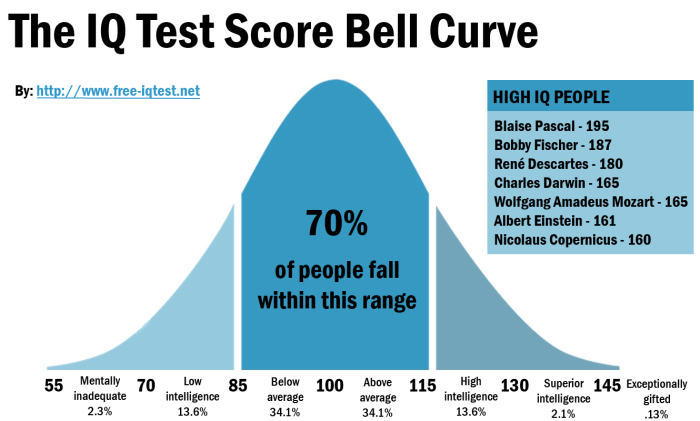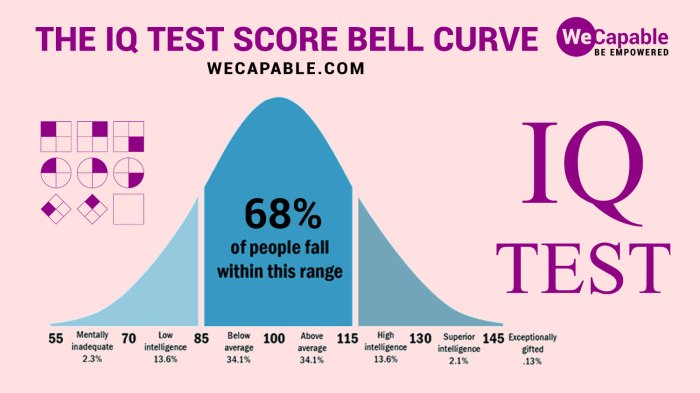Whats the Highest IQ for a 4th Grader?
What is the highest iq for a 4th grader – What’s the highest IQ for a 4th grader? This question sparks curiosity about the potential of young minds and how intelligence is measured. IQ tests are designed to assess cognitive abilities, including problem-solving, reasoning, and memory. While there’s no single “highest” IQ, understanding the concept of IQ and its relationship to age can shed light on the diverse range of intellectual abilities among fourth graders.
IQ scores are influenced by a variety of factors, including genetics, environment, and educational opportunities. A fourth grader’s IQ score can fluctuate as they develop, but a high IQ can indicate exceptional cognitive abilities and a potential for academic success.
It’s important to remember that IQ is just one measure of intelligence, and other factors like creativity, emotional intelligence, and motivation also play crucial roles in a child’s overall development.
IQ Scores and Age
IQ scores are often associated with a person’s intelligence, but it’s important to understand that they are not a static measure. IQ scores can fluctuate throughout a person’s life, particularly during childhood and adolescence. This is because intelligence is a complex trait that is influenced by a combination of genetic and environmental factors.
Developmental Factors Influencing IQ
The development of cognitive abilities, which are measured by IQ tests, is influenced by several factors:* Brain Maturation:The brain continues to develop and mature throughout childhood and adolescence. This development includes changes in brain structure, connections between neurons, and the efficiency of neural processes.
Environmental Factors
A stimulating environment with opportunities for learning, problem-solving, and social interaction can contribute to the development of cognitive abilities.
Genetics
While the exact influence of genetics on IQ is still being researched, it is clear that genetic factors play a role in individual differences in intelligence.
Health and Nutrition
Adequate nutrition and good health are essential for brain development and function.
IQ scores are not a perfect measure of intelligence. They are just one tool that can be used to assess cognitive abilities. It’s important to remember that IQ scores are just one piece of the puzzle when it comes to understanding a person’s overall intelligence and potential.
IQ Scores and Academic Performance

IQ scores and academic performance are often seen as intertwined, but the relationship is more complex than a simple correlation. While IQ can play a role in a student’s academic success, it’s not the sole determinant.
Factors Influencing Academic Performance
A student’s academic performance is influenced by various factors, including:
- IQ: IQ scores can predict a student’s potential for learning and problem-solving. A higher IQ may indicate a greater capacity for abstract thinking, understanding complex concepts, and adapting to new situations. However, it’s crucial to remember that IQ is only one piece of the puzzle.
- Motivation and Effort: A student’s dedication, perseverance, and willingness to put in the effort are crucial for academic success. Even students with high IQs may struggle if they lack motivation or effort.
- Learning Strategies and Study Habits: Effective study habits, time management skills, and the ability to learn and retain information are essential for academic success. These skills can be learned and improved through practice and guidance.
- Social and Emotional Factors: A student’s social and emotional well-being can significantly impact their academic performance. Factors like self-esteem, anxiety, and social relationships can influence their focus, motivation, and overall engagement in learning.
- Environmental Factors: A student’s home environment, access to resources, and the quality of their school can all play a role in their academic performance. Factors like parental involvement, access to technology, and a supportive learning environment can make a significant difference.
IQ Scores and Specific Academic Areas
| Academic Area | IQ Score and Performance |
|---|---|
| Reading Comprehension | Students with higher IQs may exhibit better reading comprehension skills, as they can process information and make inferences more efficiently. |
| Mathematics | IQ scores can be correlated with mathematical ability, particularly in areas like problem-solving and abstract reasoning. |
| Science | IQ scores can influence a student’s understanding of scientific concepts, their ability to conduct experiments, and their capacity for logical reasoning. |
| Writing | While IQ may play a role in language skills, writing performance is also influenced by factors like creativity, organization, and grammar proficiency. |
Nurturing Intellectual Potential

A high IQ is a valuable asset, but it’s just one piece of the puzzle when it comes to a child’s success. Nurturing a fourth grader’s intellectual potential goes beyond simply focusing on their IQ score. It involves creating a stimulating environment that encourages exploration, critical thinking, and a love for learning.
Encouraging Curiosity and Exploration, What is the highest iq for a 4th grader
Parents and educators play a crucial role in fostering a child’s intellectual growth. Encouraging curiosity and exploration is a fundamental step in this process.
- Ask open-ended questions:Instead of asking “What did you learn today?”, try “What was the most interesting thing you learned today?” or “What questions do you have about what you learned?”
- Provide opportunities for hands-on learning:Engage children in activities that involve experimentation, problem-solving, and creative expression. For example, encourage them to build structures, conduct simple science experiments, or create artwork.
- Expose them to diverse experiences:Visits to museums, art galleries, historical sites, and cultural events broaden a child’s horizons and stimulate their imagination. These experiences provide valuable insights into different perspectives and ways of thinking.
Promoting Critical Thinking Skills
Critical thinking is an essential skill that helps children analyze information, solve problems, and make informed decisions.
- Encourage questioning:Foster a classroom or home environment where children feel comfortable asking questions and challenging assumptions. This helps them develop their analytical skills and learn to think critically.
- Present different perspectives:Expose children to various viewpoints on different topics. Encourage them to consider different arguments and weigh the evidence before forming their own opinions.
- Use real-world examples:Connect academic concepts to real-life situations. For instance, when learning about fractions, discuss how they are used in everyday activities like cooking or sharing a pizza.
Cultivating a Love for Learning
A love for learning is a powerful motivator that drives intellectual growth.
- Make learning fun:Use games, puzzles, and interactive activities to make learning engaging and enjoyable. This helps children associate learning with positive experiences and encourages them to explore new ideas.
- Celebrate successes:Acknowledge and celebrate a child’s achievements, no matter how small. This reinforces their efforts and motivates them to continue learning.
- Provide opportunities for self-directed learning:Allow children to pursue their interests and explore topics that fascinate them. This fosters a sense of ownership over their learning and encourages them to become independent learners.
Creating a Supportive and Enriching Learning Environment
A supportive and enriching learning environment is crucial for a child’s intellectual development.
- Encourage collaboration:Create opportunities for children to work together on projects and learn from each other. This fosters teamwork, communication skills, and a sense of community.
- Provide access to resources:Ensure children have access to books, educational websites, and other learning materials that support their interests and academic goals. This allows them to explore their passions and delve deeper into specific topics.
- Foster a growth mindset:Emphasize the importance of effort, perseverance, and learning from mistakes. Encourage children to view challenges as opportunities for growth and development.
Final Review: What Is The Highest Iq For A 4th Grader
In conclusion, exploring the highest possible IQ for a 4th grader reveals the fascinating complexities of intelligence and its development. While exceptional IQ scores are possible, it’s essential to remember that IQ is just one piece of the puzzle.
Nurturing a supportive and stimulating learning environment, fostering a love of learning, and encouraging individual strengths are key to helping young minds reach their full potential.






